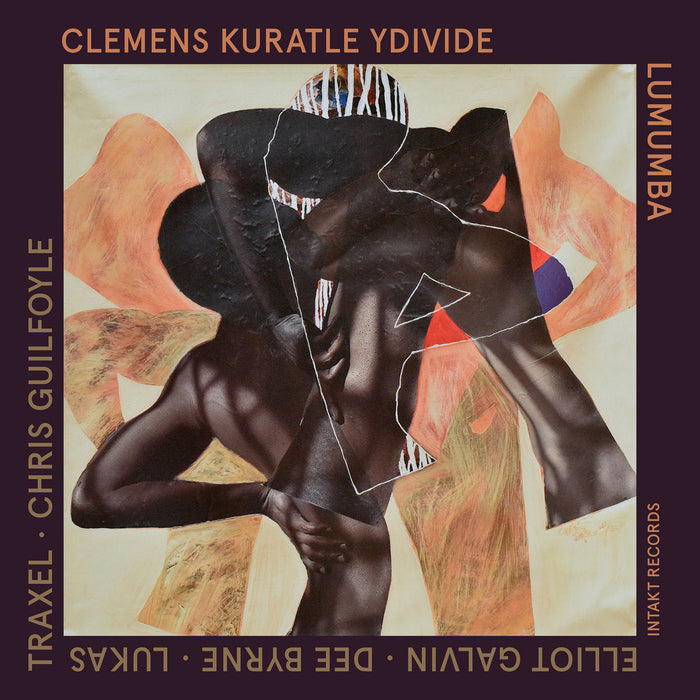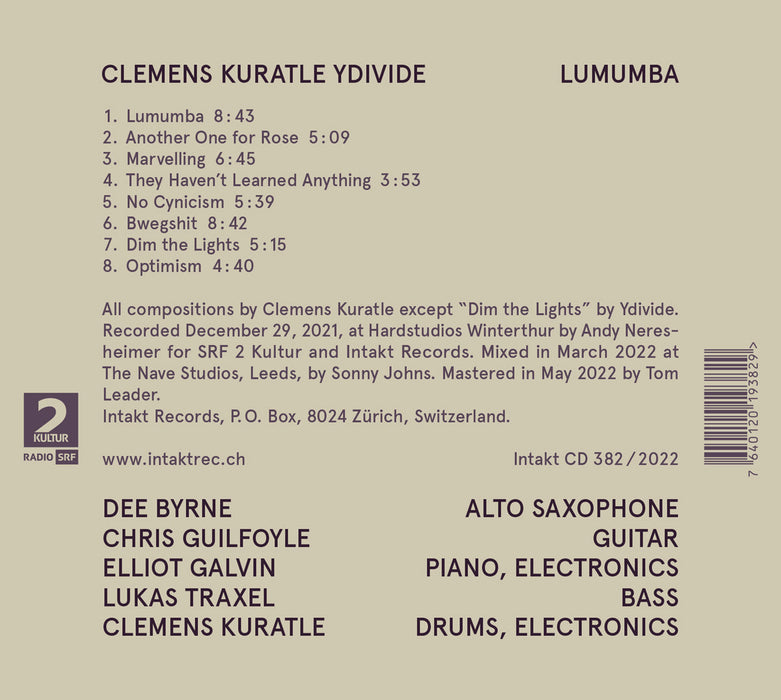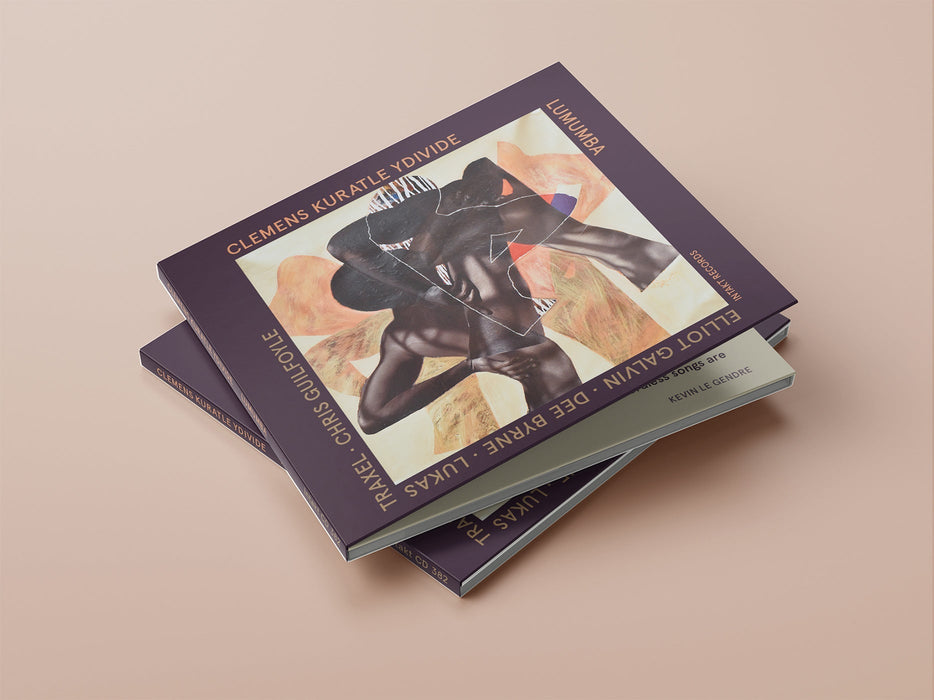


382: CLEMENS KURATLE YDIVIDE. Lumumba
Intakt Recording #382/ 2022
Dee Byrne: Alto Saxophone
Elliot Galvin: Piano & Electronics
Chris Guilfoyle: Guitar
Lukas Traxel: Bass
Clemens Kuratle: Composition, Drums & Electronics
More Info
Viele bedeutende Schlagzeuger sind grosse Bandleader. Mit ihrer Übersicht, dem Rhythmus- und Formgefühl weisen sie der Band den Weg. Der junge Schweizer Schlagzeuger Clemens Kuratle hat sich in Jazz- und Popformationen einen Namen als einfühlsamer und versierter Musiker gemacht. Nun hat er Ydivide ins Leben gerufen: ein Quintett, das die hippe, junge britische und schweizerische Jazzszene verbindet. «Internationale Formationen gibt es in der Welt der improvisierten Musik schon seit vielen Jahren. Spannendes kann passieren, wenn Grenzen überwunden werden und neugierige Menschen zusammenkommen, um eine gemeinsame Klangsprache zu schaffen, auch wenn sie vielleicht nicht dieselbe Muttersprache oder dieselben kulturellen Bezüge teilen. Ydivide, ein ausgezeichnetes europäisches Ensemble, ist ein gutes Beispiel dafür. In jedem Fall lenken die Disziplin der Komposition und die Freiheit der Improvisation die Musik jenseits spezifischer Jazzschulen, und die Präsenz von Rhythmen, die vor tänzerischer Energie knistern, sowie Ausbrüche harmonischer Turbulenzen und meditative Refrains unterstreichen, dass Kuratle Klänge einbezieht, die sowohl «in» als auch «out» sind. Das wichtigste jedoch – seine wortlosen Songs erzählen etwas», schreibt Kevin Le Gendre in den Linernotes.
Album Credits
Cover art: Collin Sekajugo
Graphic design: Jonas Schoder
Liner Notes: Kevin Le Gendre
Photo: Palma Fiacco
All compositions by Clemens Kuratle except "Dim the Lights" by Ydivide. Recorded December 29, 2021, at Hardstudios Winterthur by Andy Neresheimer for SRF 2 Kultur and Intakt Records. Mixed in March 2022 at The Nave Studios, Leeds, by Sonny Johns. Mastered in May 2022 by Tom Leader. Cover art: Collin Sekajugo. Graphic design: Jonas Schoder. Liner Notes: Kevin Le Gendre. Photo: Palma Fiacco. Produced by Clemens Kuratle and Intakt Records. Executive Producer: Florian Keller. Published by Intakt Records.
È sempre un buon segno quando un musicista che ha contribuito a creare nuove dimensioni per il proprio strumento cerca e trova il confronto con colleghi molto più giovani. Sia per i maestri alla ricerca di energie fresche e imprevedibili, sia per coloro che potrebbero anche essere sopraffatti dall'emozione e invece si mettono in gioco con semplicità. Günter "Baby" Sommer ha oggi settantanove anni e continua ad avere lo spirito incendiario di quando ne aveva trenta, i tempi in cui anche il jazz europeo aveva trovato una sua personale via alla metabolizzazione delle istanze "free". I Lucaciu Brothers (Antonio al sax contralto, Simon al pianoforte, Robert al contrabbasso), tedeschi come lui, hanno meno della metà dei suoi anni e una conoscenza profonda della storia del jazz diventata pratica strumentale in azione.
Si parte già bene, qui, con "Dunkle Wonken", un traditional struggente in cui Sommer stende una coltre tambureggiante poliritmica quasi tribale e si alza nobile e febbricitante il canto del sassofono, punteggiato dal piano quasi gospel di Simon: il primo riferimento va al gemito fremente di Albert Ayler. È invece uno scatto alla Ornette Coleman la seconda traccia, introdotta da tre minuti memorabili di assolo di Sommer, una pirotecnia di ritmi incrociati. Il titolo del disco, che ovviamente occhieggia alla "Caravan” di Duke Ellington, è anche quello di una poesia del dadaista tedesco Hugo Ball: è il settimo brano e qui c'è un'ulteriore sorpresa, con la voce grande, grossa e per nulla stropicciata dagli anni di Sommer a declamare il testo tra scatti brucianti e sonorissime sillabe. Un disco memorabile, ma soprattutto godibile e, per molti versi, trascinante.
Round-ups 2022: Jazz albums with Chris Searle
MY RECORD of the year is the reissue of the marvellous Joe Harriott Swings High (Cadillac Records), originally released in 1967 and created in a session held at, according to Harriott’s longtime Jamaican bass confrere Coleridge Goode, “a pokey little independent studio somewhere in East London.”
Goode continued: “Joe plays so fiercely that at times it seems as though he’s about to blow his alto apart.”
Hear his searing choruses on The Rake or Blues in C, but he plays with a beautiful lyricism too — alongside trumpeter Stu Hamer on A Time for Love, or as the lone horn on Polka Dots and Moonbeams.
This was an era of rampant street racism, perhaps a motivation for Harriott’s sonic ferocity. Burton-on-Trent’s master drummer Phil Seamen and pianist Pat Smythe are fully attuned too and play with a powerful empathy. It’s a very moving revival: sounds of its time and for our times too.
Take 15 endangered species and 11 powerful jazz virtuosi and create a record which campaigns for the species’ survival.
“My hope is that Red List (Palmetto Records) will help to facilitate critical yet uncomfortable conversations about changing our global habit of destroying nature for our own gain,” writes project instigator, composer and baritone saxophonist Brian Landrus.
From African Elephant to Mariana Dove, Javan Rhino to Vaquita, the notes pound, lyricise, create melody and improvise for the very future of Earth’s life.
Hearken to ex-Jazz Messenger Geoffrey Keezer’s urgent piano message on Canopy of Trees, Landrus’s committed horn and Rudy Royston’s urgent drums on the title track, altoist Jaleel Shaw’s worrisome testimony on Tigris or bassist Lonnie Plaxico’s tortured solo on Only Eight.
“Before we’d track the music we’d have a conversation about each animal,” asserts Landrus. A potent album this, with music and earthly survival locked together in beauty and defiance.
Boyhood memories of my first African hero came tumbling back as I listened to the evocative title track of the album Lumumba (Intakt Records). Led by the Swiss drummer Clemens Kuratle, his band consists of Irish guitarist Chris Guilfoyle, two English musicians — saxophonist Dee Byrne and pianist Elliot Galvin — and fellow Swiss bassist Lukas Traxel.
The heart of Europe is here, expressing the 1961 tragedy of Africa, when Congo’s Lumumba was murdered with full European connivance. “I realised what eurocentrism meant then,” says composer Kuratle, and the band plays with new European unity and hope, all through tracks like Marvelling, with some reflectively inventive Galvin and Byrne, and Guilfoyle’s awakening solo on They Haven’t Learned Anything.
Collin Sekajugo’s affectingly beautiful sleeve art, pictured, empathises with the music and the entire record is both a tribute to African heroism and a condemnation of imperial atrocity. Get hold of it for it is as much now as it is then.
In his sleeve notes to the first release of their 1989 duo performance The Art is in the Rhythm (Jazz in Britain Records), the great Yorkshire-born alto saxophonist Trevor Watts remembers his first encounters with the Irish drummer Liam Genockey and how they were “both into the rhythmic side of the music in a big way,” but with different rhythmic perspectives.
Watts has always responded to powerful drummers, whether it was his early partner in the Spontaneous Music Ensemble, John Stevens, or the brilliant Ghanaian percussionists of Moire Music, but his ripostes to Genockey’s thumping Irish rhythms are startlingly innovative, as in the maze of hornsound of Rhythmic Variants.
In the other tracks, Echoes of Bird and Dedicated to Eric D, the duo salute Parker and Dolphy respectively with inspired rhythmic union. As Genockey scuttles, crackles, rumbles and booms, Watts’s alto sings, trills, swirls and peals in a uniquely cogent recording.
https://morningstaronline.co.uk/article/b/round-ups-2022-jazz-albums-with-chris-searle
Wenn man dieses Album einmal durchgehört hat, braucht man zuerst einmal eine kleine Pause. Die fünf in England lebenden Musiker produzieren nämlich eine ganz schöne Wand an Sound. Allerdings nicht durch Lautstärke oder Chaos, sondern durch sehr diszipliniertes Musizieren und ein, vor allem auf rhythmischer Ebene, tightes Zusammenspiel. Unter den teils ausufernden Soli liegt eigentlich immer ein dickes Brett an Backings, und das drückt gewaltig. Alles ist sehr perfekt auf eine amerikanische, moderne Art, aber auch immer mit viel Leidenschaft und ordentlich Feuer gespielt. Die Kompositionen sind abwechslungsreich und mit kleinen Überraschungen, jedoch schon sehr genretreu. Es gibt die obligatorische Ballade und ab und zu ein paar elektronische Spielereien. Ein wenig Politik ist sowohl mit dem Titel als auch mit dem schönen Stücktitel Bwegshit geschickt untergemischt. Eine in ihrer leichten Wildheit sehr kontrollierte, sehr gut eingespielte Band mit einem überzeugenden Erstling. File under Modern Jazz/Snarky Puppy.
There is plenty of new releases in this edition of One Man's Jazz, headed by a retrospective of earlier works of William Parker and a who's-who of guests (Universal Tonality). Also tracking back in time are releases from drummer Idris Muhammad and with his own retrospective of his ECM releases, guitarist Steve Tibbetts. From Europe come new albums by Swiss drummer Clemens Kuratle & Ydivide and Polish bassist Wojtek Mazolewski plus a debut from the Lisbon, Portugal quartet, Apophenia, and from Argentina pianist Ernesto Jodos. We also check out the latest from pianist Julius Rodriguez and bassist Shawn Lovato.
Playlist
Santiago Leibson Sextetto "K" from Aperecerse (Kuai) 00:00
Host speaks 08:47
Wojtek Mazolewski Quintet "Spirit To All" from Spirit To All (Whirlwind) 10:12
Whit Dickey Quartet "Space Quadrants" from Astral Long Form: Staircase In Space (Tao Forms) 21:35
Julius Rodriguez "Two Way Street" from Let Sound Tell All (Verve) 28:17
Host speaks 32:13
Clemens Kuratle Ydivide "Bwegshit" from Lumumba (Intakt) 34:32
Fade In "L'Esterofilo" from Live Fast Die A Legend (Clean Feed) 43:14
Host speaks 48:39
Ernesto Jodos "Biombos" from Donde El Mundo Ocurre (Ears&Eyes) 49:45
James Brandon Lewis "Bird Of Folk Cries" from Days Of Freeman (Okeh) 58:28
Host speaks 1:05:33
James Brandon Lewis & The Messthetics "Fear Not" from single release (ANTI-) 1:06:54
Lisa Hoppe's Third Reality "Dinner With Abstract Poetry" from Dinner With Abstract Poetry ( Self-released) 1:14:45
Lisa Hoppe's Third Reality "Attias" from Dinner With Abstract Poetry (Self-released) 1:17:52
Joachim Kuhn Trio "It's Only For You" from Scream For Peace (Linoleum) 1:22:03
Host speaks 1:30:36
William Parker "Tails Of A Peacock" from Universal Tonality (AUM Fidelity) 1:32:18
Idris Muhammad "Peace and Rhythm Suite—Rhythm" from Peace And Rhythm (Craft/Concord) 1:43:11
Host speaks 1:49:06
Steve Tibbetts "Hellbound Train" from Hellbound Train: An Anthology (ECM) 1:51:16
Angles "Muted Reality" from A Muted Reality (Clean Feed) 1:528:25
Host speaks 2:13:56
Apophenia "Frenesim Do Ponto De Vista De Um Gnomo" from Prötzeler (Robalo) 2:15:11
Apophenia "Melody Fragments" from Prötzeler (Robalo) 2:26:47
Artur Malecki & The Creature "Stwor" from Widocki (FSR) 2:33:07
Will Vinson "Things" from Tripwire (Whirlwind) 2:43:57
Host speaks 2:50:51
Shawn Lovato "Microcosms—opening" from Microcosms (Ears&Eyes) 2:52:54
https://www.allaboutjazz.com/william-parker-clemens-kuratle-ernesto-jodos-and-apophenia-william-parker
Der couragierte Beginn macht hellhörig: sich wiederholende Töne aus dem Inneren eines präparierten Klaviers gehen in perkussiv gehämmerte Schläge und Höhenflüge am Saxophon über. Inspiration für den Opener >>Lumumba<< wie für das sehenswerte Cover (Collin Sekajugo) - war die verstörende Geschichte der Unabhängigkeits- und Putschbewegungen auf afrikanischem Boden. Teil dieser Geschichte ist die zuweilen geleugnete Mitverantwortung der internationalen Staatenwelt bei der Ermordung des kongolesischen Politikers Patrice Lumumba im Jahr 1961. Hiervon beeindruckt, ging Clemens Kuratle an die Formierung seiner neuen, bewusst international besetzen Band. Mechanische Rhythmen sind seine Sache nicht. Seine Vorliebe gilt vielmehr jenen kollektiv gewobenen, komplexen Rhythmen, wie diese Ornette Coleman für den Jazz fruchtbar machte. Die Kollegenschaft des initiativen Schweizer Schlagzeugers bekommt dementsprechend viel zu tun. Der aus Dublin angereiste Gitarrist Chris Guilfoyle und der Schweizer Kontrabassist Lukas Traxel teilen das von Rasanz geprägte Power-Konzept. Pianist Elliot Galvin bringt wie Kuratle Electronics ins Spiel. Besonders eindrücklich gerät das emotionsgeladene, mitunter >>schreiende<< Spiel der Saxophonistin Dee Byrne. Schon bei den Favourite Animals und im London Improvisers Orchestra auffällig geworden, lässt die hochtalentierte, Kreativität und Entschlossenheit ausstrahlenden Britin die Wände beben. In den Winterthurer Hardstudios von Andy Neresheimer exzellent aufgenommen, weicht der wuchtige, dabei nie derbe Sound dieses Quintetts auf, wenn wie im intim musizierten >>Marvelling<< oder in >>Dim the Lights<< das Tempo gedrosselt wird. Die Lichter sind da freilich noch nicht am Ausgehen. Den Schlusspunkt findet das Quintett im noch einmal die eigenen Stärken auskostenden, pushenden Rumba-Statement >>Optimism«.
Swiss drummer/electronic artist/composer Clemens Kuratle is highly impressive on composing, arrangements and his propulsive kit-work fires up a versatile young Brit-Swiss quintet, the former including Dee Byrne on sax and Elliot Galvin on keys, which shifts cohesively from abstract collective dialogue to a more structured lyricism.
Das Quintett Ydivide wird vom Schweizer Schlagzeuger und Kompo-nisten Clemens Kuratle geleitet. Kuratle, in seinem Spiel beeinflusst von Trommlern aus Burundi, dem indonesischen Gamelan oder der Gnawa Music aus Marokko, wird hier begleitet von Landsmann Lukas Traxel am Bass, dem irischen Gitarristen Chris Guilfoyle sowie den beiden Engländern Elliot Galvin am Piano und Dee Byrne am Saxophon in einem Projekt, das die Improvisation hochhält und durch Präzision besticht. Schon im Titeltrack Lumumba" zu Beginn werden Harmonien jongliert, und das spannende und kraftvolle Zusammenspiel der Musiker lädt zum genaueren Hinhören ein. Gewidmet ist das Stück dem ersten Premierminister des Kongo, Patrice Lumuba, der 1961 in einem Putsch ermordet wurde. Besonders turbulent wird es in „They Havent Learned Anything", wenn sich Byrnes Saxophonlinien mit ausgesuchten Gitarrenakkorden kreuzen. By the way: Der Bandname Ydivide stellt eine Kurzform von „Why Divide" dar - als Antwort auf den Bre-xit 2019, dem Jahr als die Formation zusammengefunden hat.
Poursuivons avec un autre batteur, le jeune suisse Clemens Kuratle, qui a organisé un quintette anglo-irlando-suisse (au moment du Brexit !), Ydivide, comprenant Dee Byrne (saxo-alto), Chris Guilfoyle (guitare), Elliot Galvin (piano, electronics) et Lukas Traxel (contrebasse). Lumumba, marche à la mémoire du leader congolais assassiné en 1961, annonce la couleur : Kuratle est un homme de conviction possédant une conscience politique qu’il tente de mettre en musique sans tirer la couverture à lui. Mais c’est un vrai leader qui sait faire tourner un groupe et l’inscrire dans le langage universel du jazz d’aujourd’****. « Lumumba »
https://culturejazz.fr/spip.php?article3852
Aiming to mix activism and improvisation, Swiss drummer Clemens Kuratle directs an international quintet through a selection of his compositions on this diversified session. The musicianship is of prime quality. But just as revolution rather than passive resistance is more likely to lead to social change, intense playing is more distinctive than relaxed iterations.
Case in point is the title track, named for Patrice Lumumba, the murdered first president of the independent Congo. Starting with Kuratle’s martial drags and stirring ruffs mixed with inner piano string rustling from the UK’s Elliot Galvin, the introduction ascends to an exposition defined by emphasized tongue stops and harsh split tones from fellow Brit alto saxophonist Dee Byrne. With vibrant head recapping in the penultimate sequence, a coda of drum patterns and keyboard clips upholds the tune’s initial strength. Some variation on a hip-hop waltz the following “Another One for Rose” makes room for horizontal frails mixed with **** twisting effects and twangs from Irish guitarist Chris Guilfoyle that face-off with concentrated drum ruffs and rumbles plus reed trills. The set’s other standout, though the title seems more scatological than subversive is “Bwegshit”. Defined by Swiss bassist Lukas Traxel’s taut and darkened string plucks and an underlying electronic drone, Bryne’s studied flattement and pressurized triple tonguing may express individuals’ frustration when change is thwarted. This is confirmed by Kuratle’s syncopated groove, although Guilfoyle’s vertical movement down the scale suggesting compromise.
Although contrapuntal reed tonguing, sometimes live processed, electrified buzzes. guiro-like cymbal ratchets, double bass thumps and string slithers enliven other tracks, some are too quietly balladic and atmospheric more Menshevik than the Bolshevik explosions of the more intense and livelier ones. The concluding “Optimism” with pedal point percussion rumbles mixed with sliding reed tonguing lives up to its idealistic title though. Yet like the band’s name, which can be expressed as Why Divide, collectivism is one virtue, but so is individual engagement in politics or music.
https://www.jazzword.com/reviews/clemens-kuratle-ydivide/
It's hard to believe that August is over, and just like the months going by at the speed of light so do new CDs and LPs... And this is why we are here with another edition of Mondo Jazz for which we have cherry-picked some of the best new albums and singles out there.
Happy listening!
Playlist
Ben Allison "Mondo Jazz Theme (feat. Ted Nash & Pyeng Threadgill)" 0:00
Stéphane Kerecki "The Booster" Out of the Silence (Outnote) 0:16
Host talks 4:48
Tom Harrell "Zatoichi" Oak Tree (Savant) 6:19
Host talks 11:37
Clemens Kuratle Ydivide "Bwegshit" Lumumba (Intakt) 12:57
Ernesto Jodos "Biombos" Donde el mundo ocurre (ears&eyes) 21:39
Host talks 30:20
John Escreet "Digital Tulips" Seismic Shift (Whirlwind) 32:46
Kristin Berardi "Bunker" The Light and the Dark (Earshift) 37:14
Run Logan Run feat. Annie Gardiner "Silver Afternoon" Silver Afternoon—Single (Worm) 42:56
Host talks 52:13
Mysteries Of The Revolution "Babylon Everything" Longing for the Dawn (Blue Serene Focus) 54:49
Yussef Dayes Experience "Rhythms of Xango" Live at Joshua Tree (Brownswood) 59:31
https://www.allaboutjazz.com/kristin-berardi-tom-harrell-john-escreet-clemens-kuratle-and-other-new-releases
